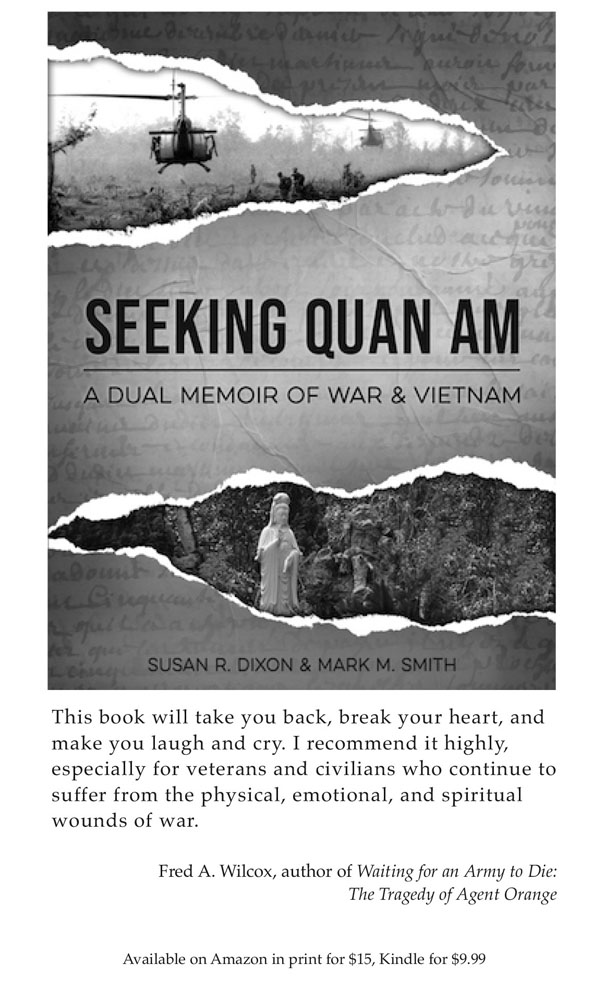 Download PDF of this full issue: v50n1.pdf (30.8 MB) Download PDF of this full issue: v50n1.pdf (30.8 MB) |
Changing a Vote
By Susan R. Dixon
[Printer-Friendly Version]
I was a senior at the University of North Carolina at Chapel Hill in 1970. I came late to anti-war activism, in part because of my age and in part because I had been pre-occupied with travel in Europe and the Middle East, but I threw myself into it when I returned in 1968. I based my activities at the Campus Y, the center for social justice on campus, where I was a vice-president. The following is an excerpt from Seeking Quan Am: A Dual Memoir of War and Vietnam, which I wrote with Vietnam veteran Mark M. Smith.
In November 1969, I marched in Washington. Many of us carried small American flags as a way of reclaiming the symbol from those who, challenging our patriotism, had used it against us. At the White House, which was ringed with school buses, I had a momentary vision: the buses became soldiers with guns turned on the demonstrators, and then they were buses again. I pushed the vision away. A few months later, at Kent State, it happened.
In May 1970, President Nixon expanded the war while saying he wasn't. I didn't know what made me more angry, the lies or the assumption that I would believe them. When four unarmed protesters were shot at Kent State, business-as-usual stopped. Grief and fury threatened to overwhelm strategy as campus leaders cast about for a focus. As an officer of the Y, I helped plan a candlelight vigil.
We decided there should be a procession and there should be coffins. It was easy to get enough candles but the coffins were a challenge. Somehow they were found and that evening I stood in a circle of little lights, close to the Old Well, holding papers and a small book. We were poised to begin when someone told us there were students running through the dorms and coming toward us. We waited in silence. The group arrived at the far side of the gathering, their grief and anger surging up against our calm. They were given candles and drawn into the group, which grew quiet again. When my part came, I let the air settle and then read a prayer for the dead.
So many students, faculty members, and townspeople attended the vigil that when the first people following the coffins had left the quad, circled the arboretum, turned back on Franklin Street and returned to the Old Well, the last of the procession had not yet left. The energy shifted, not just in the frantic students, or even just in those who walked in procession; the energy shifted on the whole campus. Later there would be explanations for why the UNC campus did not grow violent, as it could have and others did. Many explanations were reasonable, including the one that credited the fundamental "gentility" of the South. But the energy had shifted in that circle; I felt it happen.
Through the combined efforts of the Y and Student Government, we formed a plan: we would go to Washington to meet with our congressmen and senators. A few days later, seven buses and an uncounted number of cars converged on Washington where we fanned out through the offices meeting with our own representatives, or with anyone who would let us in. The group was so large the North Carolina Congressional Delegation met with us in a hearing room. Senator Sam Ervin, the venerable "Senator Sam," annoyed me with his strict interpretation of the Constitution that he used to defend the president's incursion into Cambodia and then excused himself on account of the many important things he had to do. When the junior senator, B. Everett Jordan, said he would give attention to the next bill about the war that came to his desk, the room erupted in applause. When he repeated his statement more forcefully, we gave him a standing ovation. He was our new hero and he was as good as his word: when the Cooper-Church Amendment limiting the president's war powers came before the Senate, he provided a swing vote in favor and credited the delegation from the University of North Carolina for playing a role in his decision.
Susan R. Dixon is a writer, editor, and workshop leader, living in Ithaca, NY. She maintains seekingquanam.com and susanrdixon.com.
|



